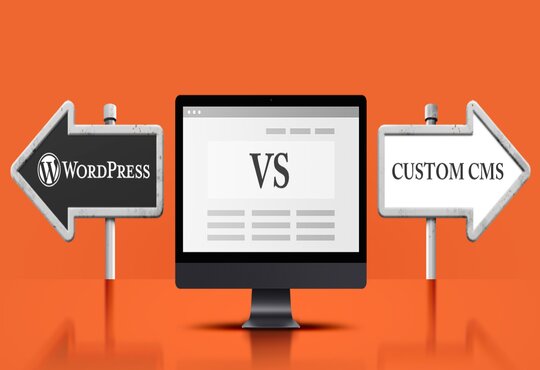
WordPress vs the New Age Website Building Frameworks
Rajan Sarma | Tuesday, 27 October 2020, 14:56 IST
 WordPress is probably the most popular Content Management System (CMS) right now. WordPress has emerged as the leading website building framework for both small personal enterprise-level businesses, as well as large eCommerce sites. WordPress has got a large community of users and an enormous force of developers that come up with all kinds of plugins and extensions that further expand its utilities.
WordPress is probably the most popular Content Management System (CMS) right now. WordPress has emerged as the leading website building framework for both small personal enterprise-level businesses, as well as large eCommerce sites. WordPress has got a large community of users and an enormous force of developers that come up with all kinds of plugins and extensions that further expand its utilities.
Having said that, WordPress is not the be-all, and end-all CMS one could opt for, and moreover, there are times when one may need WordPress alternatives for various reasons. For instance, one may not necessarily feel the need to keep adding the additional plugins for functionality improvement, which proves to be a drag at times. On the other hand, one may also have to manage frequent themes and plugins through some third party offering the plugins. Another reason may be that WordPress is not particularly user friendly. The user needs to be in constant touch with developers or hosting providers to maintain their websites. And lastly, WordPress being the most popular website building framework, is also subject to a lot of hacking and security breaches.
However, finding a WordPress alternative is not an easy decision. There are a ton of WordPress alternatives out there, each with their distinct set of advantages that it brings to the table. Here we look at a few WordPress alternatives that can be used by both relatively inexperienced users and also by website building enthusiasts:
Wix
Wix is a perfect user-friendly tool to create stunning websites for free. The uniqueness of the Wix is that it provides its users with a step-by-step wizard-like environment, wherein the user is spoon-fed through the entire process of website building. Additionally, Wix also offers a hosting solution that takes care of its user’s accounts. It enables the user to solely focus on their content, leaving the technical stuff to the Wix team available 24/7.
Advantages:
· Over 500 pre-made designs available to pick
· Designs are optimized for smartphones and tablets as well.
· In Wix, the user can customize their websites with a drag a drop feature, which is only available as a plugin at WordPress.
· Integrated Social media
· Functional editors for content and images
· All sites come with a default custom domain
Ideal For:
· Users who wish to customize and build their website on their own.
· Users with no prior experience
Squarespace
Squarespace has taken the website building domain by storm. It is the fastest growing website builder in terms of popularity. Squarespace is a fantastic tool for website creation, whether one needs it for its personal blog or an eCommerce store or simply for a portfolio to promote one’s freelance skills. It is the web hosting framework of choice for novice users.
Squarespace offers a ton of designs and pamphlets to choose from, ranging from aesthetically pleasing ones to very minimalistic ones. The best part is that similar to Wix, the Squarespace developers take care of everything, leaving the user to focus solely on the content. The only downside to Squarespace is that it is a paid service right from the beginning.
Advantages:
· The best collection of modern looking and aesthetically pleasing templates.
· Designs are optimized for smartphones and tablets.
· Multiple templates can be used on a single site
· Social media integration available
· All sites come with a default domain with the option to buy a custom domain.
Ideal for:
· An excellent choice for artists, freelancers, and personal blogs.
· Suitable to promote brick and mortar business stores
· Best for users with no prior experience
Magento
Next on the list is Magento, an eCommerce tool particularly useful for business owners wishing to run online stores. The primary community version comes at a free cost; however, the enterprise version comes at a whopping $18000. As an advanced eCommerce platform, Magento delivers its users any requirement they need pertaining to their online business.
Advantages:
· Magento offers an advanced eCommerce functionality that includes inventory management, calculating shipping costs, coupon management, payment gateway, shopping carts, and lots more
· A significant number of good PDF user guides
· Provides web services API
· Offers more than 5000 extensions and add-ons.
· Bult in multilingual capacity
Ideal for:
· Business owners wishing to launch eCommerce stores.
· Best for business owners looking to promote their store or expand online presence
Expression Engine
Expression Engine is an extremely capable CMS powered by the popular web development framework called CodeIgniter. The idea behind the Expression Engine is to deliver advanced content management functionality for websites and web applications.
Advantages:
· It has extensive content publishing capacities.
· The search engines are optimes by URLs
· Gives advanced traffic analytic options
· Offers anti-spam tools
· Various built-in modules: discussion forum, wiki, mailing list, simple e-commerce.
· Offers advanced user management with access to multiple groups.
· Advanced admin features; logs, data exports, etc.
Ideal for:
For larger websites and web development projects.
CIO Viewpoint
EdTech Business Models: Unlocking Success in...
By Atulya Kaushik, Co-founder and CEO of PrepInsta
CIO's Role in Driving Enterprise Sustainability
By Manoj Deorukhkar, Chief Information Officer at Sterling & Wilson Limited
Transforming employee experience through the...
By Prasad Ramakrishnan, CIO of Freshworks
CXO Insights
How leveraging technology solutions automates...
By Bimlesh Prasad
Why Digitalization is Crucial to Staying...
By Janifha Evangeline
How Digitization is Shattering Real Estate...












